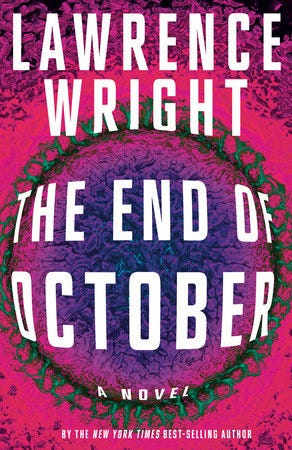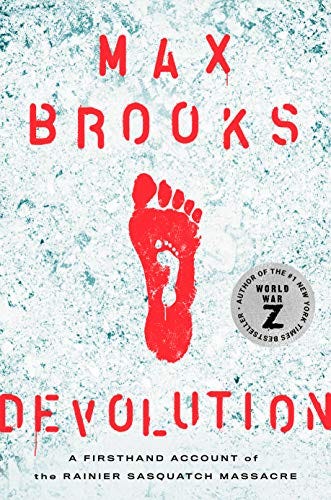What to Read Next (No. 127): a trio of new apocalyptic books
In the midst of a pandemic and widespread social upheaval, I have, for some reason, been compelled to read a trio of new apocalypse-focused books. It’s always been a genre I’ve enjoyed; when done well, it’s not just entertaining mayhem, but a meaningful look at the things that really matter in life and the aspects of humanity that are most worth holding on to. These types of books also tend to provide sobering and much-needed truths about the unruly planet we call home.
I enjoyed all of the below titles and I think you will too.
The End of October by Lawrence Wright (2020, 376 pages)

When an early review copy of The End of October hit my doorstep in early January, my initial response was a big dose of innocent excitement for a new Lawrence Wright book. I had previously read The Looming Tower and Going Clear and was pumped to check out his attempt at apocalypse-by-pandemic, which was set to be released to the pubic on April 28. I had some other reading on my plate, so it found a spot at the back of the bookshelf, and my mind, to be picked up again a few months down the road.
Then on March 11, when the reality of COVID-19 hit the nation like a ton of bricks, The End of October rushed back into my consciousness. As wary as I was of reading a pandemic apocalypse novel in the midst of one, I couldn’t help it, and by March 15, it was on my “Books Read” list.
In The End of October, epidemiologist Henry Parsons is investigating a mysterious illness that originated in Indonesia and then spread to the rest of the world via the annual Hajj in Mecca. The sickness is quickly pegged as stemming from a novel coronavirus (a now-familiar term), and from there, it’s off to the races to quell the spread as much as possible.
Wright does some decent work in conveying the everyday psychological disruptions of a pandemic and the plot gets very apocalyptic, very quickly. What the book was most accurate about — which I only know because of the experience of living through the last few months — was how the virus would turn political. The response, the vaccine even, was filtered through the political cogs that never stopped turning.
The characters in Wright’s novel aren’t as fleshed out as I hoped they’d be, but overall it’s a good book. It was uncanny and eerie, to say the least, to read what turned out to be a prophetic novel (which was years in the making!) published smack dab in the middle of an actual pandemic. Maybe wait a year — unless you’re a bit of a masochist — but give it a shot.
Devolution by Max Brooks (2020, 282 pages)

I loved Brooks’ World War Z enough to read it twice in the span of a year. It’s the best of the genre, without a doubt, and inspired one of my first Art of Manliness articles. So when I saw the subject of his new novel — a sasquatch massacre that followed on the heels of the volcanic eruption of Mt. Rainier — I couldn’t wait to dig in.
The story of World War Z was told as a series of journalistic dispatches on the origins of the zombie apocalypse; Devolution is structured somewhat similarly, mostly as the found journal entries of a terrified woman who can’t believe what she’s living through.
After the eruption of Mt. Rainier, a pack of sasquatch escapes the immediate vicinity only to run into a new sustainable neighborhood tucked away in the woods. It’s a diverse group of about 10 people trying out a modern, but environmentally friendly way to live. The problem is that it’s a pretty technology-dependent community and most of these folks don’t know squat about real survival.
As with World War Z, there are a lot of real-life lessons to be had within the pages of this bloody thriller/horror tale. In our Instagram age, we tend to view nature as something grand and cutesy which is mostly there for our pleasure. But those environments — the woods, the mountains, the canyons — and the creatures within them are not governed by any sort of Golden Rule; they are harsh places that turn very dangerous, very quickly when you don’t know what you’re doing.
Devolution isn’t as good as Brooks’ first novel, but it was damn entertaining nonetheless and well worth your time. (PS: It definitely did not lead to me spending too much time googling sasquatch stuff . . .)
Notes from an Apocalypse by Mark O’Connell (2020, 257 pages)

This was a far different book than I was expecting. Irish non-fiction writer Mark O’Connell philosophically and movingly explores the apocalypse in culture — each chapter brings him to a different part of the world to probe the end of times in society. The first chapter is about extreme preppers — those folks who stockpile foodstuffs and weapons to prepare for society’s imminent collapse. Other chapters find him looking into the luxury apocalypse retreats that the ultra-rich are buying up in the form of underground bunkers (for only about $30K a pop!) and vast land tracts in pristine places (like New Zealand). He ventures to Chernobyl’s ground zero to see what life is like there; can it tell us anything about what happens post-apocalypse?
It’s written in rich prose and like most good books in this genre — whether fiction or non-fiction — carries deep and meaningful questions. The idea for the book came about as his own children were arriving, which prompted him to wonder if it was even worth bringing kids into a world that was doing its best to crumble around him in the form of turbulent politics, rising oceans, and global pandemics.
For me, that type of questioning just pushes me even harder to build a world that is worth living in. And even our infrastructures do crumble a bit, humans are adaptable creatures; the gift of life itself, and its attendant joys, should be striven for at all costs.
Anyways . . . there were other interesting takeaways too. The most thought-provoking: For O’Connell, the very idea of extreme prepping or luxury bunker real estate is anathema to what it means to be human. When the shit hits the fan, why do those folks assume that society would retreat into individualistic family units? For centuries — millennia! — humans have proven that the key to survival is in banding together and even in inter-dependently relying on each other. Apocalypse doesn’t, by definition, mean roving bands of marauders.
Notes from an Apocalypse is a bit pessimistic, but also a bit optimistic, and will certainly have you thinking about apocalyptic issues from new angles. While O’Connell’s writing is bit flourishy at times, it’s different — in a good way — from you expect out of the genre and subject matter.
That’s all for me this week. Thanks for reading, and for the time and inbox space — I really appreciate it. Also, let me know what you’re reading these days! I’d love to hear.
-Jeremy
